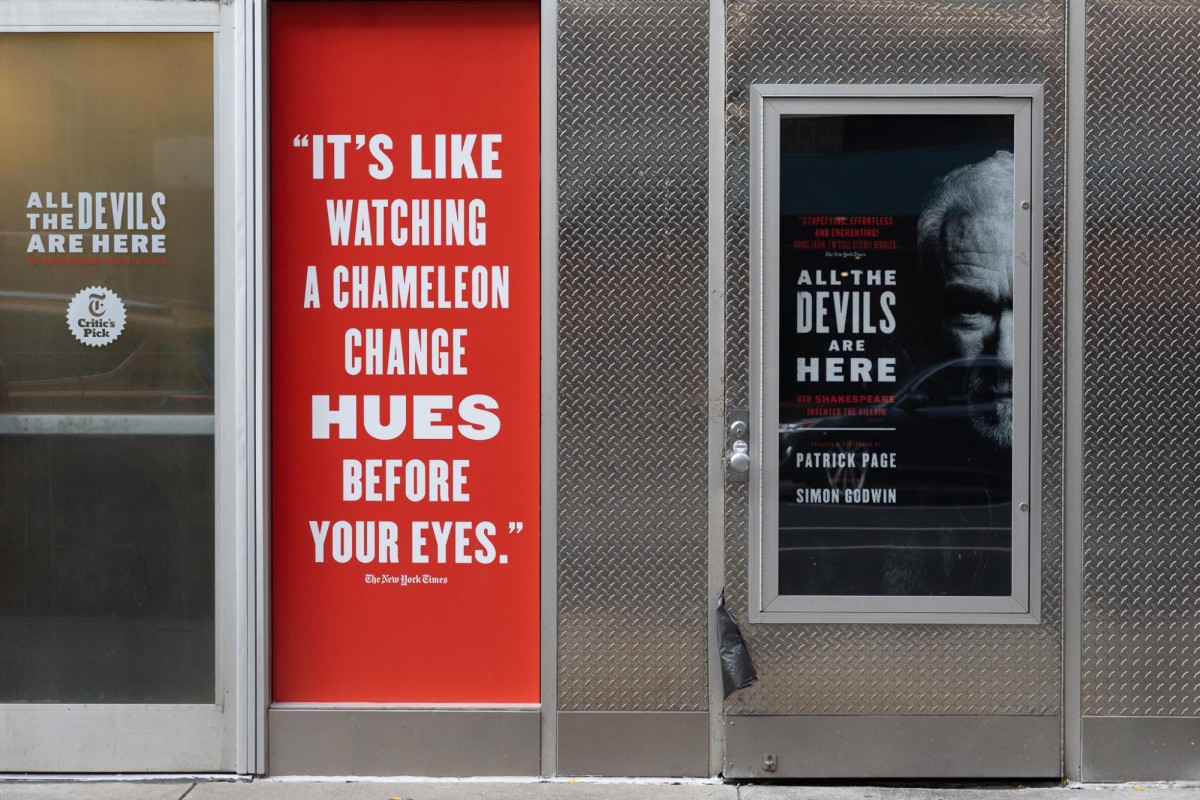Through “All The Devils Are Here: How Shakespeare Invented the Villain,” viewers are taken on a trek through the horrifying. The reinvigorated Off-Broadway one-man-show explores the life and work of William Shakespeare with a focus on his villains. The 90-minute piece was created by Grammy-winner Patrick Page and was directed by Simon Godwin.
On the surface, Page guides the audience through time as Shakespeare creates his most devious characters. Page explores the origins of villainy in the show by analyzing the early vices in Shakespeare’s morality plays and how his younger self was first exposed to evil. By the end of the 90 minutes, “All the Devils Are Here” evolves into a case study on the human condition and just how petrifying it can be.
Page commands the stage from the moment the lights come up. With a staff in hand, he invokes the words of Lady Macbeth: “Come, you spirits that tend on mortal thoughts,” he chants, weaving through her devilish invocation. These moments feel terrifying, but he then drops the possession and falls into himself — a gentle, sweet man. He does not have the evil aura of such diabolical characters but that of a kindly guide, here to take us through Shakespeare’s work.
He explores many of Shakespeare’s characters, ranging from the hilariously devious Malvolio of “Twelfth Night” to the guiltily murderous Claudius of “Hamlet.” Through it all, Page harnesses his charming personality by interposing the explorations of these characters with enchanting stories. He even includes personal stories, sharing the mental impact playing Macbeth had on him.
Emily Rebholz’s intricate wardrobe design helps the audience move through transitions in the show. As the show begins, Page is clad in a full suit, and he slowly removes articles of clothing as the play progresses. With each shift in villain, there is a shift in costume.
Meanwhile, the lighting design of Stacey Derosier and the stage design of Arnulfo Maldonado shift the theater from a charming Off-Broadway house to a petrifying hellscape of wickedness and every locale in between. The audience peers into the Shylock’s office through set dressing, and a straightforward spotlight brings us into a tent-like 17th-century performance venue.
While all of these details work together to make the play an immersive experience, the heart of the production is undoubtedly its star.
Page delivers a masterclass in Shakespeare analysis and performance. He gracefully and seamlessly shifts between characters, and exhibits mastery over Shakespeare’s texts, ensuring the authenticity of every line while still making the complicated language digestible.
Perhaps his villainous repertoire of characters that earned him the Playbill-bestowed name of “the villain of Broadway” prepared him for this moment in time. Page’s career runs the gamut from Hades in “Hadestown” to the ever-so-kind Grinch in “Dr. Seuss’ How the Grinch Stole Christmas! The Musical,” even taking part in the doomed production of “Spiderman: Turn off the Dark” as the Green Goblin. In an October interview with the Theatre Development Fund, he said that “the key to playing compelling villains is to never dismiss them as purely evil.”
During the show, he asks the audience: Was Iago really a psychopath in “Othello?” Was Shylock really evil in “The Merchant of Venice?” If we were labeled as a villain simply based on qualities we hold, how would we feel?
In exploring these questions, Page reveals a frightening truth: each villain possesses qualities we all have. We can be blinded by jealousy, like Edmund from “King Lear” or find ourselves to be ridiculous ego-maniacs with no sense of fun, like Malvolio of “Twelfth Night.” That’s what Shakespeare meant, Page says during the way, when he wrote in “The Tempest” that “Hell is empty / And all the devils are here,” as he gestured to his own heart.
Through his gentility and charm, Page gives us permission to look within ourselves and acknowledge our own evils, so that we may learn to accept and confront them.
“All The Devils Are Here” is playing at Union Square’s DR2 Theatre until Jan. 7, 2024.
Contact Joseph Paladino at [email protected].























































































































































